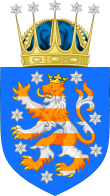Elections in Marienbourg
 |
|---|
| This article is part of a series on the politics and government of Marienbourg |
Elections in Marienbourg take place generally only to determine the political composition of the national unicameral legislature, the Ducal Diet, and to choose the Prefects of the municipalities that make up the country. Elections take place regularly every six months through the non-proportional voting system of block voting incorporating panachage. Suffrage is universal for literate citizens from the age of 14, except criminals sentenced to prison for 5 years or more, or for a shorter period, but with repeat offenses. Voting is compulsory, but such obligation is not enforced and concur in no impairment.
The Marienbourgish political scenario is de facto that of a two-party system, although there are no legal provisions for this. However, opposing political parties maintain a commitment to bipartisanship.
National elections
The Ducal Diet has 10 members, 8 of which are elected by plurality in two equally-divided multi-member electoral districts for a maximum 6-months term. Voters can vote for up to four candidates in their district. The 2 remaining members of the Ducal Diet are appointed to their seats by the Sovereign for terms of 1 year only after the electoral result, so that the balance of the electoral result is maintained. For example, if 5 members from party A and 3 from party B are elected, the Monarch must appoint one more member from party A and one more from party B. In addition, just as voters can vote for up to four candidates, they can choose to vote more than once for the same candidate, giving up the option of voting for four.
National elections are governed by the Political Instrument of the Bases of the Duchy and administered by the Ministry of Home Affairs. Elected members represent their constituencies, but are generally more concerned with national politics than regional politics. The leader of the party most likely to hold the confidence of the Diet becomes the Minister-President. There is no requirement for affiliation with political parties to stand for election, and candidates can be independent. As such, parties and independents can form government coalitions, which, if they exceed the opposition's number of seats, gives them the power to form a minority government.Once candidates are elected, sitting members of Diet are permitted to "cross the floor" switching party affiliation without having to first resign and restand for office under their new affiliation. Sitting members may also be dismissed from or voluntarily leave their party and become independents. As a result, the distribution of seats by party affiliation often fluctuates in between elections.
If a government loses a confidence motion the Sovereign, acting as a sentinel, it is tasked with calling new elections or, on rare occasions subject to referendum approval, the Sovereign can directly seek out another party leader who might be able to command the confidence of the chamber and ask them to form a government. Furthermore, the Monarch can constitutionally dissolve parliament at will, however, a referendum can undo his action. Elections can only be postponed with a unanimous vote of parliament or by decree of the Sovereign, and are naturally postponed in the event of the death of one of its members or of family members and close friends of national officials, or in the event of war or insurrection.